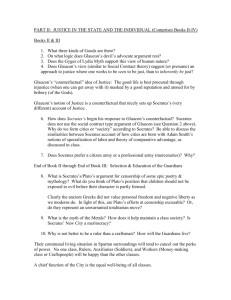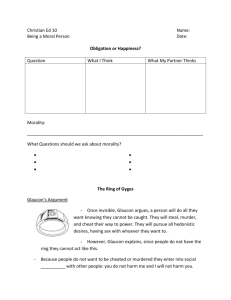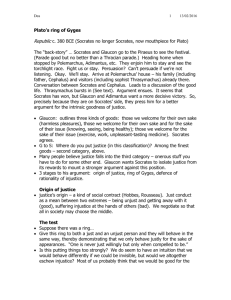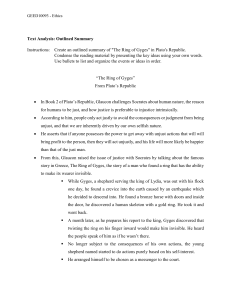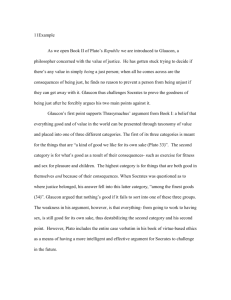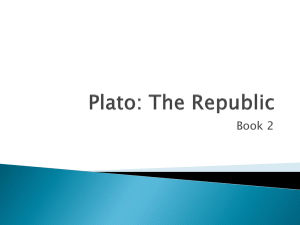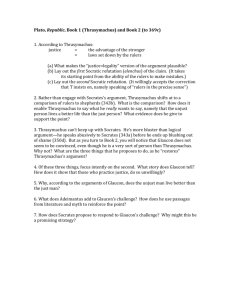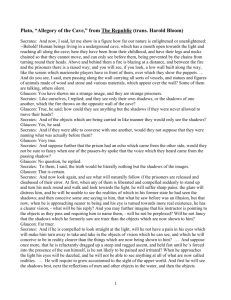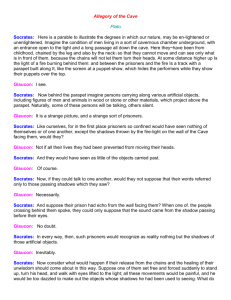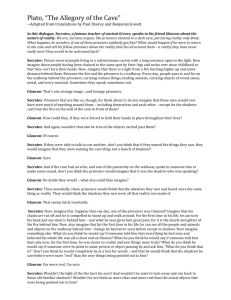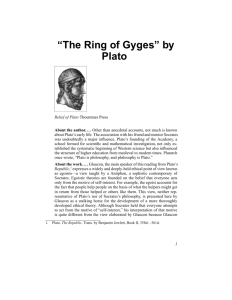Niel Humphreys
advertisement
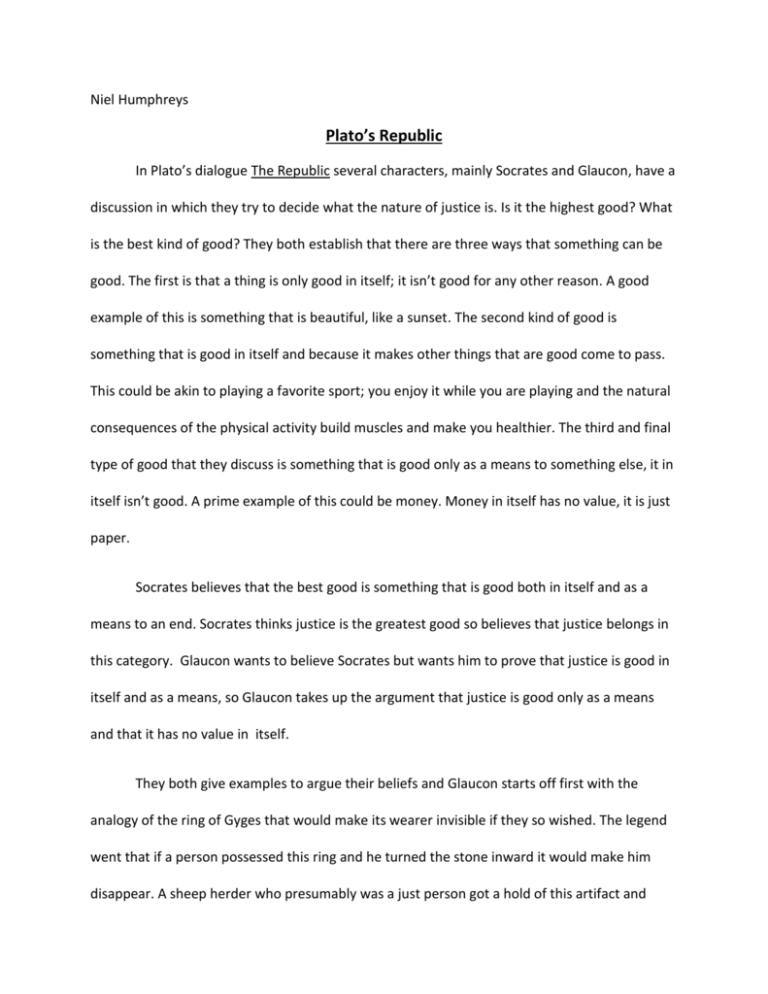
Niel Humphreys Plato’s Republic In Plato’s dialogue The Republic several characters, mainly Socrates and Glaucon, have a discussion in which they try to decide what the nature of justice is. Is it the highest good? What is the best kind of good? They both establish that there are three ways that something can be good. The first is that a thing is only good in itself; it isn’t good for any other reason. A good example of this is something that is beautiful, like a sunset. The second kind of good is something that is good in itself and because it makes other things that are good come to pass. This could be akin to playing a favorite sport; you enjoy it while you are playing and the natural consequences of the physical activity build muscles and make you healthier. The third and final type of good that they discuss is something that is good only as a means to something else, it in itself isn’t good. A prime example of this could be money. Money in itself has no value, it is just paper. Socrates believes that the best good is something that is good both in itself and as a means to an end. Socrates thinks justice is the greatest good so believes that justice belongs in this category. Glaucon wants to believe Socrates but wants him to prove that justice is good in itself and as a means, so Glaucon takes up the argument that justice is good only as a means and that it has no value in itself. They both give examples to argue their beliefs and Glaucon starts off first with the analogy of the ring of Gyges that would make its wearer invisible if they so wished. The legend went that if a person possessed this ring and he turned the stone inward it would make him disappear. A sheep herder who presumably was a just person got a hold of this artifact and upon learning of the true nature immediately became a messenger of the king, went in to his house and seduced his wife, and ultimately killed the king and seized his power for himself. With this example Glaucon thinks he is able to prove that men who behave in a just way do it because they lack the power to do injustice and get away with it, and that given the opportunity to get away with injustice a man will invariably commit some injustice to better his life. This indicates that men don’t truly believe that they think justice is the best thing in life or the best way to live happily. Glaucon, to be fair, decides to give the ring to an unjust person. He says that they would continue doing injustice, the only thing that would differ is that they wouldn’t ever get caught therefore that person would not have a reputation for injustice. After his first example he gives another that argues that having a reputation for justice is the thing that actually makes justice good, that justice by itself isn’t any good at all. To illustrate this he gives an example of two men yet again. He devises a plan that will show who will be the happiest towards the end of his life between the two types of men. It is obvious, he thinks, to assume that a man who is just that has a reputation for justice will be happy and that an unjust person with a reputation for injustice will be miserable. To find out what makes the men either miserable or happy he decides to invert the two situations. He says that an unjust man that has the reputation and appearance of a just man will undoubtedly gain power and riches and political clout if he so wishes and will be a happy man because people think he does the right thing. He will be able to increase his worldly possessions and power in any way he sees fit without the fear or repercussion of getting tried for his crimes. He then suggests that the man who is truly just but has been convicted of crimes that he did not actually do, since he has the appearance of an unjust man, will end up rotting in a jail cell until he is finally executed. It is obvious that Glaucon thinks the first situation is more favorable and that the unjust man with the good reputation is going to be far happier than the just man with the bad reputation. There are some problems with both of these arguments however. As with the first example about the sheep herder with the Ring of Gyges, that man may have indeed have decided to commit crimes after he had his new found power, but it is unlikely that every single person would do this. The sheep herder could have been an unjust man to begin with, we have no evidence to prove otherwise. There would be at least one person that would stick to their moral guns so to speak. If that person had lived a moral and virtuous life they wouldn’t change that because they now just because they had the opportunity to. Many people make the right choice every day even though there is no incentive to and there isn’t anyone around to see them do it. These types of people do exist so Glaucon’s first argument doesn’t hold up. His second argument doesn’t stand because it is impossible to judge who actually might be the most happy with their life. The man who has cheated and lied and possibly killed to get to the top of his political career or to gain all his riches may have the worst kinds of torment a person can bear. He may feel the guilt of all the wrong doings he has committed and know there is no way to change what he has done and gain forgiveness for the people he has hurt. On the flipside the just man that is shackled up in a prison cell knowing that he is going to die a terrible public death on the following morning might take solace in the fact that he never committed a crime in his entire life and that he will die an innocent man and that his blood will be on the hands of those that prosecuted him. After Glaucon finishes with both his examples Socrates decides to take the floor to uphold his side of the argument, that justice is good in itself as well. To do this he thinks it will be easier to identify justice in an individual by first looking at something much larger. He decides to construct a city that he believes will be perfectly just if operating as intended. After a lengthy description we are left with three different classes within the city that make it tick. He leaves us with the craftsmen and farmers, then an auxiliary class that is somewhat of a military, and finally the ruling class that he refers to as guardians. These guardians are in charge of the army and of guarding the city and making sure that the city is stays safe. He goes into great detail describing how these guardians need to be brought up in order to fulfill their position, but what he basically says is that they need to grow up with a high moral background and that they will never be able to handle or deal with money so that they will have no outside influences affecting why they make decisions for the city. The guardians will have no other motives in making their decisions other than what is best for the city and its future. Socrates thinks this will be the perfect and most just city because the people in power will never be allowed to become corrupt because there is no reason for them to become so. As a guardian even though you have the most power in the city you won’t be the richest or most popular or well dressed, the position is more of a service than anything else. He then states that justice in this city will be the three different classes in the city doing their own jobs without interrupting or trying to control another of the classes. Relating this to an individual, Socrates says that each person’s mind has three different parts. There is desire or appetite, this correlates with the craftsmen in the city, then emotion, this is similar to the military he states, and finally there is logic and reason and this is the same as the guardian class. He says that each part is important and must coexist in the individual, but just as is the case with the city if one of these is out of balance so then the individual will be. It is logic’s job to help regulate both an individual’s appetites and their emotions. He says that in order for justice to be in the individual each part must do its function without encroaching on one of the other part’s job. This definition of justice helps illustrate that justice is good in itself because we see that if a person is internally just they will have greater mental health because of it. I agree with Socrates in that he thinks that justice is good in both ways, but I don’t agree with how he got there. I don’t think it is really possible to divide a person’s soul into three distinct categories for one, and even if it was I have a problem with his guardians. If the guardians had no real worldly knowledge and didn’t know anything about money or its influence I don’t think it would be possible for them to make good choices for the other two classes because the health of the other two classes more or less depends on money. When it comes down to it I think it is irrelevant to talk about justice or right and wrong unless you believe in a just god. Without god and a higher law there is no right or wrong to be judged by. The only definition of good would be something that makes a person happy and different things make different people happy. Some people feel terrible when they do something harmful to another person and can hardly live with themselves afterwards; on the other hand some people couldn’t care less as long as they get what they want in the end. So without a higher law to judge people by there could be no solid definition of justice or good because everyone has a different view of what makes them happy or miserable.
